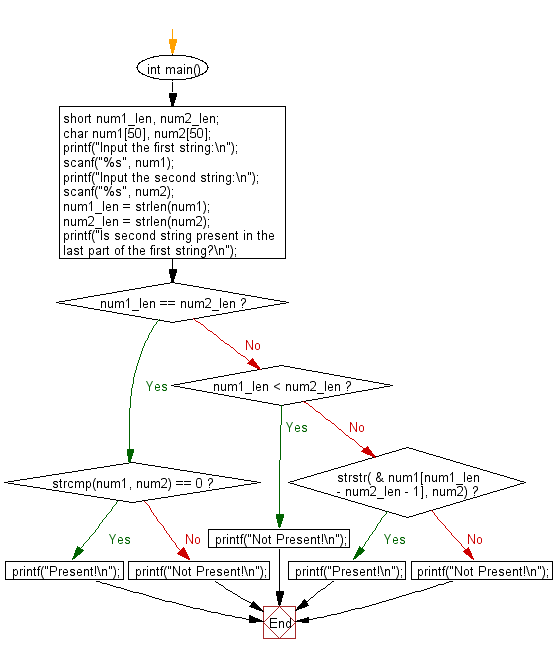C Exercises: Check if a string is present in the last part of another string
C Basic Declarations and Expressions: Exercise-131 with Solution
Write a C program that accepts two strings and check whether the second string present in the last part of the first string.
Sample Solution:
C Code:
#include <stdio.h>
#include <string.h>
int main() {
short num1_len, num2_len;
char num1[50], num2[50];
printf("Input the first string:\n");
scanf("%s", num1);
printf("Input the second string:\n");
scanf("%s", num2);
num1_len = strlen(num1);
num2_len = strlen(num2);
printf("Is second string present in the last part of the first string?\n");
if (num1_len == num2_len)
if (strcmp(num1, num2) == 0)
printf("Present!\n");
else
printf("Not Present!\n");
else if (num1_len < num2_len)
printf("Not Present!\n");
else if (strstr( & num1[num1_len - num2_len - 1], num2))
printf("Present!\n");
else
printf("Not Present!\n");
}
Sample Output:
Input the first string: abcdef Input the second string: ef Is second string present in the last part of the first string? Present!
Flowchart:

C programming Code Editor:
Contribute your code and comments through Disqus.
Previous: Write a C program to create an array of length n and fill the array elements with integer values. Now find the smallest value and it’s position within the array.
Next: Write a Java program to find heights of the top three building in descending order from eight given buildings.
What is the difficulty level of this exercise?
Test your Programming skills with w3resource's quiz.
C Programming: Tips of the Day
Static variable inside of a function in C
The scope of variable is where the variable name can be seen. Here, x is visible only inside function foo().
The lifetime of a variable is the period over which it exists. If x were defined without the keyword static, the lifetime would be from the entry into foo() to the return from foo(); so it would be re-initialized to 5 on every call.
The keyword static acts to extend the lifetime of a variable to the lifetime of the programme; e.g. initialization occurs once and once only and then the variable retains its value - whatever it has come to be - over all future calls to foo().
Ref : https://bit.ly/3fOq7XP
- New Content published on w3resource:
- HTML-CSS Practical: Exercises, Practice, Solution
- Java Regular Expression: Exercises, Practice, Solution
- Scala Programming Exercises, Practice, Solution
- Python Itertools exercises
- Python Numpy exercises
- Python GeoPy Package exercises
- Python Pandas exercises
- Python nltk exercises
- Python BeautifulSoup exercises
- Form Template
- Composer - PHP Package Manager
- PHPUnit - PHP Testing
- Laravel - PHP Framework
- Angular - JavaScript Framework
- Vue - JavaScript Framework
- Jest - JavaScript Testing Framework
